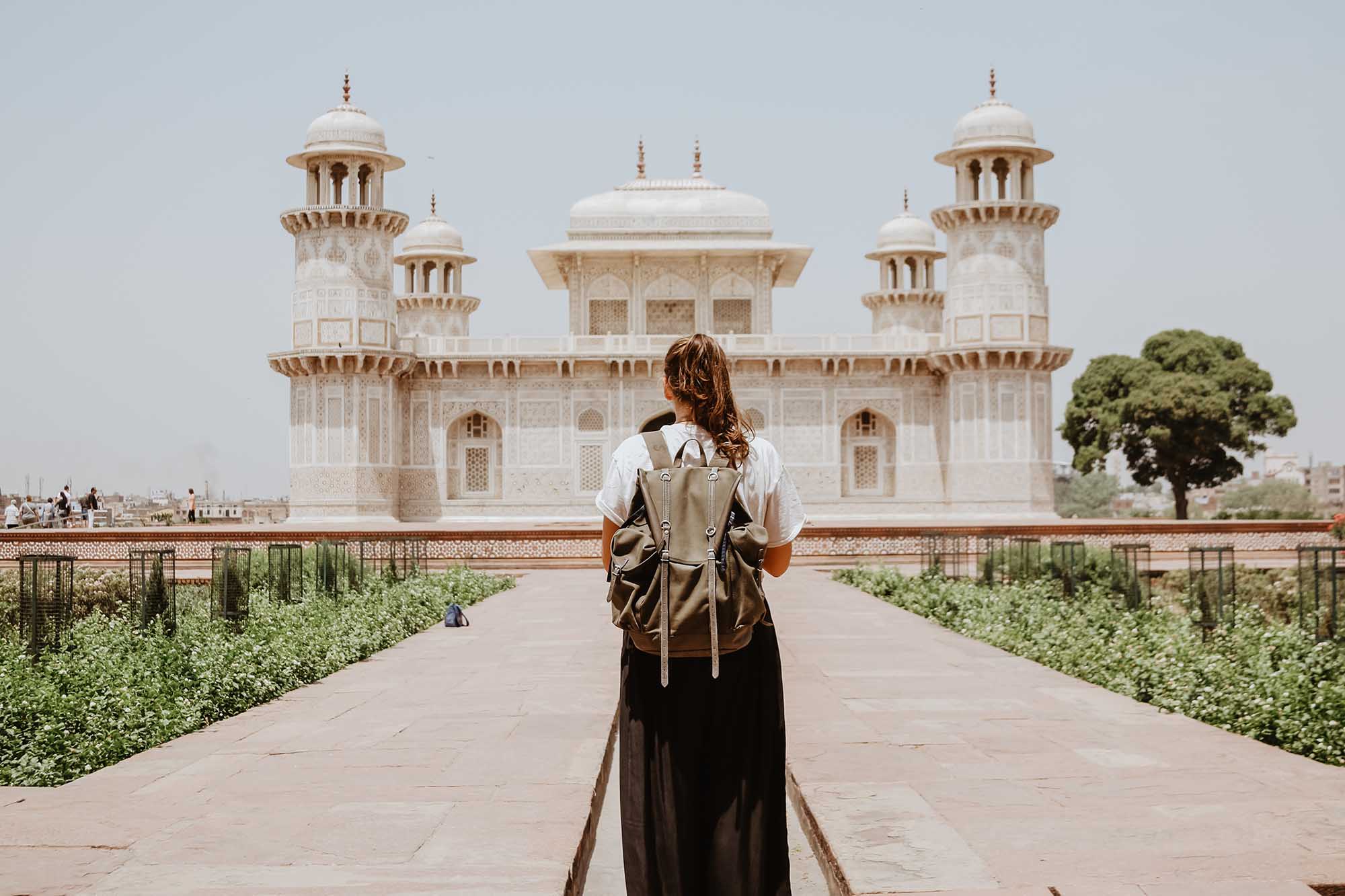While no one’s about to say ‘no thanks’ to a freshly cracked coconut on a white sandy beach somewhere, we’re all drawn to travel for something more – the journey. Opening ourselves up to these adventures provides the perfect canvas for self-discovery and figuring out what really matters to us.
Granted, the constant changes in our daily routine and surroundings when we’re on the road can make it a real challenge to maintain the ethical and eco-friendly habits we’ve built up at home. Luckily, we’re here to help with 12 simple habits which we can take with us anywhere. So no matter where we’re going, we can always travel in (sustainable) style.
1. Opt for the carbon offset when flying
If you’re going on an overseas adventure, your flights will inevitably account for the majority of your carbon footprint. By choosing to fork out for the carbon offset option when paying for your flights, you are actually contributing toward environmental initiatives focused on energy efficiency, renewable technologies, reforestation, and the preservation of old-growth forests.
These projects aim to reduce the impacts of climate change by either reducing the amount of greenhouse gasses being emitted or by creating carbon sinks. Paying that little extra to ‘offset’ the carbon dioxide can make your entire trip more climate-friendly.
The important thing is to do your research beforehand to find a reputable offset program that is transparent and robust. Of course, if you’re happy to have a holiday closer to home and take a train instead…even better!
2. Pack sustainably and lightly
Interestingly, packing only what you’ll really need means less stuff for you to carry around and less chance that you’ll need to indulge in a series of fast fashion impulse buys at your destination. As an additional bonus, travelling with carry-on only means less time standing at the baggage carousel (or tracking down lost suitcases), less money spent on baggage fees, and more time and money for you to spend, well travelling! Check out our guide to packing a suitcase that’s sustainable, stylish and light!
3. Travel locally
The great thing is that exploring your own country can give you a new found appreciation for where you live and it can also benefit your local community and the environment. Travelling by train, bus or as a group in a car instead of flying to your holiday destination means you’ll produce up to 50% fewer greenhouse gas emissions, as well as creating local jobs.
4. Choose eco-friendly accommodation and tours
Eco-resorts are a great option if want to stay somewhere close to nature that also gives back to its surroundings. Whether you’re seeking a bit of luxury or something simple – there’s something to suit most budgets and tastes. Genuinely sustainable and socially ethical accommodation can incorporate many benefits to the local environment and community. From the use of renewable energy and conservation of natural habitats to supporting organic produce, and providing a living wage and worker empowerment to locals.
There are also many sustainable tour options that allow you to tread lightly and respectfully as you visit amazing places. As always, the key things to look out for are transparency and independent accreditation.
5. BYO toiletries
No matter where you stay, you can minimise your environmental impact by choosing to have your room serviced less frequently and bringing your own toiletries. When you’re preparing for a trip, check out non-toxic and cruelty-free toiletries and cosmetics to take with you. For all you ladies reading this, it’s useful to note that some countries don’t have the same access to sanitary products or sanitary disposal systems as we do here in Australia.
Consider a reusable menstrual cup. You can leave them in for up to 12 hours and you don’t require a bin to dispose of them in (handy when you’re really off road!). But be mindful in places where the water is unsafe to drink and rinse your cup with purified or boiled water to avoid infection.

6. Eat locally-sourced seasonal food
One of the absolute best parts of travelling to a new place is enjoying the local cuisine! You’ll have a more authentic experience, contribute to the local economy, and avoid the environmental impact of importing food (and beer). Concerned about the dreaded traveller’s stomach bug? Choosing well-cooked vegetarian dishes will keep you safe and if you can see them cooking it, all the better. Wherever you are, locally-sourced food prepared in a traditional way will always be fresher, taste better and (most likely) cheaper. So get in there and try something new!
7. Avoid plastic bottled water
Carrying a reusable water bottle at home may be second nature but don’t forget to take it on holidays with you as well. As long as the bottle is empty you can take it on your flight and fill it up when you arrive. If you’re travelling to a country with unsafe drinking water, you can use a SteriPEN or sterilisation tablets to purify the water before drinking. Bottled water in many countries is treated water rather than spring water so if you’re sterilising your own correctly, you’ll be getting the same water without the waste.
8. Purchase souvenirs responsibly
Do you really want to bring home the same mass-produced souvenirs everyone else seems to? Instead of stocking up on the cheap (and often very unethically produced) trinkets, consider investing in one or two unique and locally crafted souvenirs. Even better if they’re from an eco-friendly or sustainable brand that supports artisans in the local community you’re travelling in. Being of a higher quality they’ll last longer, and if they’re useful items like clothing or homewares, you’ll appreciate them even more when you get home.
Also, it’s so important to avoid purchasing any products made from animals. Many threatened and endangered species are hunted for trade, including bear, tigers, and pangolins. The free Wildlife Witness app “allows tourists and locals to easily report wildlife trade by taking a photo, pinning the exact location of an incident and sending these important details to TRAFFIC”.
9. Minimise plastic bags
Typical travel essentials to bring in your day bag include a camera, guidebook, and water bottle. But no sustainable traveller’s day bag is complete without at least one foldable, reusable shopping tote.
10. Respect natural and cultural sites
Being an ethical traveller is as much about people as it is about the environment. Get to know a bit about the local culture before you go. The last thing you want to do is to offend the locals or get yourself into trouble with the law. Consider local dress codes, eating customs and some language basics like hello, please and thank you. If you’re going to cultural sites or into the countryside, respect any additional restrictions on dress and photos, and remember – leave only footprints and take only memories. Kwintessential provides free etiquette guides online. And when taking photos, respect other people and ask before you snap.
11. Be mindful of the impacts of your actions
The level of poverty in many countries can be both saddening and overwhelming. Although we know it exists, it’s easy to ignore until we come face to face with it. Unfortunately, while giving money to beggars is the intuitive thing to do, there is mounting evidence that your gesture of goodwill will not necessarily help in the way you hope. Often these beggars, children, in particular, are being exploited by other people and even organisations that take most of the money collected. If you want to help the beggars directly you could try offering food rather than money or donate to a reputable local non-profit. Another option is “…building into all future holidays an extra expense component: planning to carefully select a person, family or project where a large direct gift might transform their situation.”
12. Volunteer
If you like the idea of making a difference while travelling, there are a wide variety of volunteering opportunities all over the world. You could spend a week teaching English in India or two months on a lion reserve in South Africa. Involvement Volunteers International have something for everyone and can assist with the whole process. Just make sure you check the legitimacy of the organisation. You don’t want to end up in the trap of voluntourism.
What other actions do you take to make sure you’re being mindful of the local people and environment when you travel? Let us know in the comments.


















